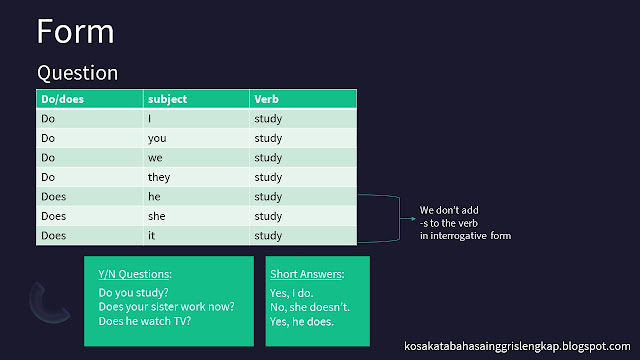Materi Pelajaran The Present Simple | Teori dan Latihan Soal
Sobat telah mempelajari present continuous? Kalau sudah mempelajari materi dan mengerjakan latihan soalnya, maka mari kita lanjutkan materi pelajaran bahasa Inggris selanjutnya, yaitu Simple Present Tense.
Catatan Pelajaran The present Simple
1. Penggunaan present simple
Kita menggunakan bentuk simple present tense, jika dalam kondisi berikut:
a. Untuk mengekspresikan pemikiran/perasaan (thought or feeling).
Contoh :
- I love sport.
Saya suka olahraga.
- I hate a dirty room.
Saya tidak suka (benci) ruangan kotor.
- I like her.
Saya suka dia.
b. Untuk mengekspresikan kondisi (state), fakta (fact), sesuatu yang benar (true).
Contoh:
- I live quite near.
Saya tinggal cukup dekat.
- This bag belongs to Rosma.
Tas ini punya Rosma.
- The sun rises every day.
Matahari terbit setiap hari.
c. Untuk mengekspresikan aktivitas yang berulang (repeated action).
Contoh :
- I study every day.
Saya belajar setiap hari.
- I watch TV every saturday.
Saya menonton TV setiap hari sabtu.
- I get up at five o'clock every day.
Saya bangun jam 5 setiap hari.
d. Untuk mengekspresikan things in general (sesuatu secara umum).
Contoh kalimat:
- Nurses look after patients in the hospitals.
Perawat merawat pasien di rumah sakit.
- The shop opens at 8.00 in the morning.
Toko itu buka jam 8 pagi.
- I come from Saudi.
Saya berasal dari Saudi.
2. Pola/bentuk Present Simple
a. Positive
I/you/we/they + verb
He/she/it + verb -s
Pada bentuk positive, kita menggunakan atau menambahkan akhiran -s pada verb untuk he, she, it. Namun untuk bentuk negative dan pertanyaan, verb tidak ditambah akhiran -s.
Contoh:
- I speak English.
- We speak English.
- He speaks English.
- She speaks English.
b. Negative
I/you/we/they + do not + verb
He/she/it + does not + verb
Contraction
- do not => don't
- does not => doesn't
Contoh :
- They don't speak English.
- You don't speak English.
- He doesn't speak English.
- She doesn't speak English.
c. Question
Do + I/you/we/they + verb?
Does + he/she/it + verb?
Contoh:
- Do you speak English?
- Do they speak English?
- Does he speak English?
- Does she speak English?
Pola bentuk wh question
wh question + do + I/you/we/they + verb?
wh question + does + he/she/it + verb?
Contoh :
- What language do you speak?
- When do they travel?
- Where does the bus stop?
- When does she go to the school?
Short answer
Question: Do you speak English?
Answer : Yes, I do
Question: Does she speak English?
Answer: No, she doesn't
3. Kaidah penulisan verb menjadi verb -s
a. verb yang berakhiran -ss, -sh, -ch, -x , maka verb ditambah akhiran -es.
contoh:
- finish => finishes
- watch => watches
b. verb yang berakhiran -y, maka verb ditambah akhiran -ies
Contoh :
- study => studies
c. Beberapa verb berakhiran -o seperti go, do => verb ditambah akhiran -es
Contoh:
- go => goes
- do => does
d. verb have => menjadi has
e. verb yang umum lainnya => ditambahkan akhiran -s
Contoh:
- play => plays
- work => works
- change => changes
Summary spelling rules untuk verb -s terdapat pada gambar di bawah:
4. Contoh keterangan waktu (adverb of time) pada simple present tense
- every : every day, every morning, every friday, every weekend, etc.
- always
- generally
- usually
- often
- sometimes
- rarely
- seldom
- never
Summary keterangan waktu terdapat pada gambar di bawah:
Contoh kalimat menggunakan adverb of time
- I always travel with my wife.
- He usually takes the bus.
- She often goes to bed late.
Latihan soal
a. Ubah kalimat berikut ke dalam bentuk negative dan interrogative
1. Asrini works every day.
2. We watch TV after lunch.
3. Mariana plays tennis on Friday.
4. Ahmad has two houses.
5. They visit me twice a week.
b. ubah kalimat berikut ke bentuk interrogative dan wh-question.
1. We live near here.
2. Rosma likes to drink coffee.
3. Rahma always drink tea.
4. They do everything well.
5. I play tennis twice a week.
c. Jawab pertanyaan berikut
1. Do you play football every saturday?
2. What do you do after dinner?
3. How often does your father use his tool?
4. Where do you usually spend your holiday?
5. When does a man go to see a doctor?
Jawaban soal
a. Ubah kalimat berikut ke dalam bentuk negative dan interrogative
1. Asrini works every day.
negatif : Asrini doesn't work every day.
interrogative: Does Asrini work every day?
2. We watch TV after lunch.
negatif : We don't watch TV after lunch.
interrogative: Do we watch TV after lunch?
3. Mariana plays tennis on Friday.
negatif : Mariana doesn't play tennis on Friday.
interrogative: Does Mariana play tennis on Friday?
4. Ahmad has two houses.
negatif : Ahmad doesn't have two houses.
interrogative: Does Ahmad have two houses?
5. They visit me twice a week.
negatif : They don't visit me twice a week.
interrogative: Do they visit me twice a week?
b. ubah kalimat berikut ke bentuk interrogative dan wh-question.
1. We live near here.
interrogative: Do they live near here?
wh question: Where do they live?
2. Rosma likes to drink coffee.
interrogative: Does Rosma like to drink coffee?
wh question: What does Rosma like to drink?
3. Rahma always drink tea.
interrogative: Does Rahma always drink tea?
wh question: What does Rahma always drink?
4. They do everything well.
interrogative: Do they do everything well?
wh question: How do they do everything?
5. I play tennis twice a week.
interrogative: Do you play tennis twice a week?
wh question: How often do you play tennis?
c. Jawab pertanyaan berikut
1. Do you play football every saturday?
Yes, I do.
or
No, I don't.
2. What do you do after dinner?
I usually read a book.
3. How often does your father use his tool?
He never uses it.
4. Where do you usually spend your holiday?
I usually spend my holiday in Doha.
5. When does a man go to see a doctor?
He goes to see a doctor when he is sick.
=================================
Untuk melengkapi teori dan menambah pemahaman tentang simple present tense, silakan baca materi pelajaran di bawah ini:
- Penggunaan simple present tense
- Latihan soal present simple beserta jawaban dan pembahasannya
Bagi sobat yang ingin download gambar/tabel di atas, silakan download versi pdfnya di sini.










No comments:
Post a Comment